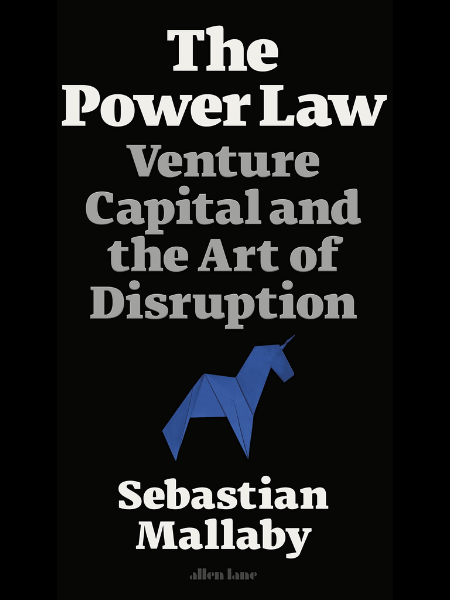We’re delighted to present our interview with Sebastian Mallaby, award-winning journalist and author, who recently published his latest book 'The Power Law: Venture Capital and the Making of the New Future'. Well-read among the team at Vauban, The Power Law is as entertaining as it is educational about the Venture Capital world. A two-time Pulitzer Prize finalist, Sebastian is the Paul A. Volcker senior fellow for international economics at the Council on Foreign Relations and a contributing columnist for the Washington Post, the Financial Times, the Atlantic and the New York Times.
Ulric Musset: Venture capitalists are true characters, they’re never boring and always have crazy stories. Among the many venture capitalists you met writing your book, what was your favourite experience?
Sebastian Mallaby: Vinod Khosla who was the most successful investor in Silicon valley during the 1990s at Kleiner Perkins. He did a series of unbelievable bets on the people that made the internet possible. He made billions and billions of dollars for Kleiner Perkins and their limited partners - even more than John Doerr, his slightly more famous partner who backed Amazon and Google. Vinod is a very charismatic guy, a very funny character. He got married as a young man in India where he grew up and didn't like religion. So he said to his father before the ceremony “I'm going to set my watch and have an alarm. After 30 minutes, this religious service has to be finished.” The thing that I remember about talking with Vinod is just how ambitious he is about this power law idea, that you should only invest in things that have this massive transformative upside potential. It's not worth backing a company, which he describes as, you know, one piece of toilet paper not two, he wants real transmission. Go big or go home.
What was the most interesting thing you learned about VC investing?
How VCs value early stage companies when you have two people with a dream who walk into your office and tell you a story. You can't discount the future cash flows because there's no cash flow. There's no book-to-value ratio because there's no book value. You don't know what the market size is because the start-up is going to invent the market. All of these things mean you have no quantitative guidelines. How do you even deploy capital in that area?
In a way, the biggest, most interesting intellectual insight was just to understand that there's no getting around the fact that this area of investing is incredibly risky, but you have to make those high potential power law bets that can make more than 10X on your investment to justify all the ones which will go to zero. And so the way of managing risk is not to hedge against it, like in hedge funds. The way of managing risk in venture capital is to embrace risk, go for the most exciting start-up prospects and hope that one out of 10 will do 10X, 20X - and then you'll make money.
To IPO, or IP-no?
What do you think about the political stance of Democrats wanting to push companies to IPO earlier for more disclosure and to enable access to retail investors, versus Republicans who are fine with private companies staying private, but want to lower the threshold effect so more people can access venture. What do you believe is the correct approach here?
That’s a really interesting question. There's no getting around the reality that investing in a venture capital fund which probably has a five to seven year payback time, or longer sometimes, is not something that everybody can afford to do, tying their money up like that. Even before you get to the risks, the two and twenty fee structure makes it quite tricky for somebody with less money to invest in these vehicles. There is a case for saying that the Democrat approach of earlier IPOs, such that tech companies go into the public market with shares accessible to all, is probably the better approach.
The amount of capital raised privately by Google and Amazon before they IPO’d is disproportionately smaller compared to the amounts of cash raised now by private companies like Klarna, Stripe and Revolut – why do you think that’s the case? Do you think they’re raising the capital because they need it, or because the capital is available so they just take it?
If all these companies can raise unbelievable amounts of capital privately, they do. It's nicer than having to go public where you're going to have quarterly disclosures and possibly give away your tactics. The leaders of these private companies do it for stealth reasons, in part. They want to be able to go into a new area with a new product without their competitors seeing them coming, and feel that would be compromised if they go public earlier.
Speaking of raising unbelievable amounts, I know of a founder who wanted to raise a 30 million Series B or C from SoftBank. After seeing his financial forecasts, Softbank came back saying they’d like to invest…but wanted to see a 300 million financial forecast and see what he’d do with 10 times more money. Wild!
I think SoftBank took it to the extreme in a way which did some damage to the ecosystem. They pushed founders to grow even faster than an ambitious founder would want to grow. If you take a company like WeWork, which was doing quite well earlier on when it was a Series A company and making money, it then went crazy around series C or so. Part of that was that SoftBank came in and WeWork raised so much money that then there was pressure to expand very fast and things went crazy.
Who makes the best VC investor?
You cover several VC investor profiles in your book: the investment banker, the tech-savvy investor who might be an ex-founder or ex-operator. What are their common personality traits, can anyone become a venture fund investor?
There's a clear difference between venture investors and hedge fund investors. Hedge fund investors tend to be quite introverted. They arrive at a view about the market, mostly by looking at numbers on their screens, or maybe talking to a very select number of people on their team, and they're pretty private. Whereas venture investors cannot be insular. They have to go out and network. You have to meet and persuade entrepreneurs that your money is greener than the other guy who's trying to get into that deal. You need to be good at making human connections. You need to be extroverted. You need to be out there with a constant schedule. A VC is somebody who gets up and has breakfast with one person and then 17 cups of coffee (hopefully decaffeinated) by the end of the day, because you’re meeting with the five engineers that your most recent portfolio company might want to hire, you're meeting with potential customers for your portfolio company, or meeting with 10 start-ups that you might or might not back. I think that's what all VCs have in common.
Within that category there are these big variations. To boil it down, the successful people I met in Silicon valley had two out of three of the following things:
1) They had an advanced engineering degree or some kind of technical skill.
2) They had been to a top business school, probably Stanford, maybe Harvard.
3) They had been either the founder or an early employee of a successful start-up.
You don't have to have all three of those things, but having two out of three is pretty good.
How do you think the venture world is going to evolve based on the increased complexity of the world? Are we going to see more specialized forms of investors, or does it still work to be truly global and sector agnostic to diversify your risk and hit the home runs?
A clear trend in the history of venture as I explore in the book is that people were completely generalist in the seventies and the sixties. In 1983, Accel Capital was launched and they were the first to self-consciously specialize and say that as a fund, they would only do two or three different areas - telecoms, software, and a bit of health tech. Even then, that wasn't that specialist because within software, of course, there's lots of sub-specialties, but that was the first move towards specialization. Over time it's become more and more specialized. I think you're right, that's going to continue. There's just going to be this division and specialization of labour that as the world becomes more complicated and the economy becomes more sophisticated, you need to be more and more specialized.
However, I also think that we should remember the famous George Soros quote “I don't play the game. I look for changes in the rules of the game”. Being able to allocate capital across a bunch of different technical areas is surely a key venture capital skill. A big decision that any partnership has to make is, for example, “Do we do more biotech on the theory that CRISPR and gene sequencing and all that stuff is going to suddenly make biotech more profitable because more stuff will be invented? Or do we think that the regulatory barriers to entry for new drugs remain so high, that it's still going to be really difficult to make money”, and that macro decision about how attractive is biotech versus crypto versus SaaS. That's the first thing you've got to decide. There’s a chance that venture companies specialized in just one area might get trapped into a technology that may be hot for five years and then won't be hot, and then they'll do badly.
Some emerging managers outperform established VCs. Why do you think that is, and what are the interesting differences between emerging and established VCs?
There is a trend around the solo VC model, the one-man-band. There are several examples of people who have broken in successfully like Steve Anderson of Baseline Ventures. It can work if it's the right individual. The key feature is embeddedness. A strong pipeline of deals is based on how embedded you are in the network of entrepreneurs.
It was so interesting to discover during the course of this book how established players like Sequoia have done well year after year since the 1970s. You really discover something special: the way they allocate capital is extremely sophisticated and disciplined, and they leverage their brand. They’re competitive, pretty ruthless and very, very good. There's a reason why the top quartile has been persistent in performance and why they scoop up the lion's share of the total return in the sector.
Europe vs US: The Culture Shift
What about competition between countries? What’s your take on the differences between the European and American VC ecosystems: some say Europe will follow the US’ path and soon catch up, others say the mindset of Europeans is simply too risk averse to allow that catch up to happen.
I think that Europe is following the same trajectory as the US did and will catch up. There are those who claim “Look, the culture in Europe is just different.”, but my view is that culture changes. Culture is not static. The culture in the 1950s United States was not entrepreneurial, right? The classic business book of the 1950s was the ‘Organization man’, white collar workers joining one company, staying there loyally for their entire career and retiring on their 60th birthdays with gold watches. That was the 1950s US model. It changed from the late fifties through the sixties and into the seventies. Why? Because venture capitalists started to show up and back the occasional people who wanted to be entrepreneurial. And then when some of those turned out to be Fairchild Semiconductor, Intel, Apple, and other big successes of the early period, it created this role model - just like Spotify is a role model in Europe- and then more and more people wanted to copy it. The US didn’t begin entrepreneurial, but the culture became entrepreneurial because venture capitalists were active. I think that's exactly what's going to happen in Europe.
Launching a VC now
You published your book before the change in the macro environment. Do you think now is a good time to invest in VC or start a VC fund?
I think it is a good time. Investors now have more time to evaluate deals, and when you're starting a fund you're probably riding a learning curve, so that extra time is very useful. The valuations are lower. It might be easier for start-ups to hire good technical people given there's less competition for them. There are lots of good things about starting now. Sure, the public markets are depressed, but you're not trying to exit for approximately seven years anyway. It's true that the US and European economies are likely going into a recession, which is not good if you're starting a company, but on the other hand, the first year of the company is often focused on building and fine tuning the product, so you’d be going to market a bit later.
So I think it's a great time! The problem is that you've got LPs who have lost ~20% of the value of their public equities. And so the share that they're left with in private equity, including venture capital, looks very big on paper because the public stuff has just shrunk. They want to rebalance and they're feeling a bit nervous. So while it may be tough to raise the money, if you can then it's a really a terrific time to be launching a fund. Raising money might end up being easier than what we’re worrying about given the inflationary pressures on LPs to deploy capital they’re sitting on.
I hear stories about such and such endowment saying that they have to cut back on their VC allocation because the public markets have shrunk. But hopefully that endowment is going to sit there in some internal meeting over the next month or so, and say “Wait a minute! Guys, this is crazy. This is the time when we should go into venture capital” because it's early stage and it's better to be using your capital to build a company in an early stage situation than being in the public markets when who knows what's going to happen and it's entirely driven by macro factors.
Some people describe venture as a ‘lifo’ asset class - last-in, first-out- where it is the last asset class very traditional investors will add. And when restructuring their portfolio, it's VC that gets cut.
It depends on the geography. Europe is younger in this path of institutionalizing venture capital. There might be more LIFO in Europe simply because people are just not so used to it. But I know for a fact that the university endowment world in the United States is very focused on the fact that the funds that went big on venture capital over the last 10, 12 years, are the funds that have outperformed- there’s almost a direct correlation. Bowden is a small college in Maine that had a very well-performing endowment because they got a VC allocation of some size. They bet on that, and it paid off. So I think that, you know, the willingness amongst key LPs is in the US at least to stick with venture is going to be pretty strong.
While at Vauban we highly recommend reading your book The Power Law, what is your favourite book?
A really fun book about early finance is called The Money Game by Adam Smith. It's a book about the 1960s and the crazy boom, which crashed at the end of the 1960s similar to our recent crash.Vauban would like to re-iterate our thanks to Sebastian for taking the time to do this interview. For readers who are unfamiliar with Vauban, Vauban makes it effortless to launch your VC funds, SPVs and syndicates in hours, not months. With over $1bn deployed through our end-to-end platform, we automate your legals, financial reporting, banking & LP onboarding. Focus on what matters: finding legendary companies and the capital to fuel them.

Buy The Power Law here

